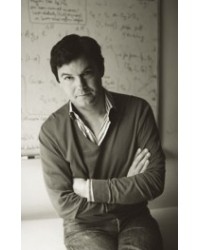Thomas Piketty

Thomas Piketty, (born May 7, 1971, Clichy, France), French economist who was best known for Le Capital au XXIe siècle (2013; Capital in the Twenty-first Century).
Piketty was born to militant Trotskyite parents and was later politically affiliated with the French Socialist Party. After he took the baccalauréat examination, he spent two years preparing for the École Normale Supérieure (ENS) entrance examination. From the ENS he received (1990) an M.Sc. degree in mathematics. In 1993 he was awarded a Ph.D. in economics from the École des Hautes Études en Sciences Sociales (EHESS) and the London School of Economics European doctoral program for a dissertation on the theory of the redistribution of wealth. After Piketty taught (1993–95) at the Massachusetts Institute of Technology, he returned to France as a research fellow (1995–2000) at the Centre National de la Recherche Scientifique. He became professor of economics at the EHESS (2000) and also at the Paris School of Economics (2007), of which he was the founding director. He was the author of numerous other books and articles and, in collaboration with French American economist Emmanuel Saez, British economist Anthony B. Atkinson, and Facundo Alvaredo of Argentina, was a compiler of the World Top Incomes Database.
In 2014 Piketty gained international celebrity with the English publication of Capital in the Twenty-first Century. The previously little-known author and his nearly 700-page unexpected best seller also became the subject of a lively debate between liberals and conservatives over economic inequality, the distribution of wealth, and the future of capitalism. Piketty’s principal claim in Capital in the Twenty-first Century was that there is a “central contradiction of capitalism.” He maintained that the average return on capital exceeds the rate of economic growth, so without countervailing factors—such as World Wars I and II, the Great Depression of the 1930s, or specific government action—inherited wealth will grow faster than earned wealth, leading to unsustainable levels of economic inequality that could threaten democracy. Unchecked, this contradiction will ultimately bring a return to what he called the “patrimonial capitalism” of the 19th century (as shown in the novels of such authors as Jane Austen and Honoré de Balzac, wherein the preferred path to wealth is inheritance or marriage rather than labour). He based his conclusions on 200 years of tax records from the United States and Europe, especially France. Much of this data was collected by Piketty himself as well as Atkinson and Saez.
\€18.40 (36.00 лв.) €23.01 (45.00 лв.) Ex Tax: €16.88 (33.02 лв.)



